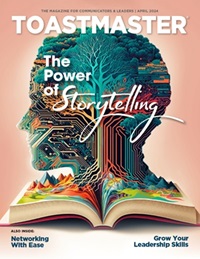 Projects in the new Speechcraft digital experience feature interactive tools such as self-assessments and videos.
Projects in the new Speechcraft digital experience feature interactive tools such as self-assessments and videos.Speechcraft® is like Toastmasters 101—a chance for clubs to teach what is essentially a course on public speaking. The training workshop can be a valuable membership-building tool, as experienced members share Toastmasters fundamentals with non-members, who ideally decide to further their learning by becoming members themselves.
The Victoria Quay Club, for one, has made excellent use of this popular outreach program. David Nicholas, DTM, co-founder of the Western Australia club, says the group typically presents Speechcraft at least once a year.
“We have recruited new members from Speechcraft regularly, and some of those members have been outstanding and stayed (in the club) for a very long time,” says Nicholas, a 25-year Toastmaster. “I think Speechcraft is one of the best things available to clubs.”
The program is expected to become even better. As durable as Speechcraft has been, it needed modernizing, and to that end, the program has been updated by the Toastmasters International Education Team. Speechcraft content—previously contained in a series of print materials—is now digital, including projects, forms, and resources. Participants’ projects feature such interactive tools as videos, quizzes, and self-assessments.
In the new Speechcraft digital experience, participants are called Speechcrafters. The sponsoring Toastmasters club member running the sessions is the coordinator. Coordinators and Speechcrafters register for Speechcraft on the Toastmasters website, through Base Camp, the online Toastmasters gateway to Pathways learning.
A Better Fit With Pathways
Speechcraft is not being overhauled—the program’s core aspects will remain in place. The training workshop can still be presented in four, six, or eight sessions, typically for one to two hours each, and each session features a structured agenda, including Table Topics®, speeches, evaluations, educational presentations, and other meeting elements. But the content has been revised to better reflect the principles of Pathways, the organization’s education program. One key concept: applying what you learn. Whether Speechcrafters gain valuable tips from a speech evaluator, from program content, or through some other method, applying that information in future speeches is the best way to improve.
For example, in “Vocal Variety,” one of 10 projects in the updated Speechcraft, participants learn that using silent spaces in a speech is one way to engage your audience’s attention. At the end of the project, Speechcrafters must “identify at least one place in your next speech you will try to use silence to make your point.”
Speechcraft participants can earn educational credit in Pathways for the speeches they deliver in the workshop.
The final project references future speeches, with the expectation that Speechcrafters will join Toastmasters clubs to continue their experiential learning. They can earn educational credit in Pathways for the speeches they deliver in the workshop. They can also earn digital badges—one for each speech, plus two “feedback” badges they can receive from (and give to) fellow Speechcrafters. Coordinators, meanwhile, can earn credit toward the Distinguished Toastmaster award.
Beginning With the Basics
Speechcraft gives non-members as well as new club members a short-term immersion in the basics of the Toastmasters experience. The coordinator and other experienced club members guide participants in each session. The workshop can be conducted as part of your club meeting (which can also be helpful to new members), or outside the club setting, like in a community organization or business. It can also be held in person or virtually. If done in person, coordinators can print out the digital materials needed.
Members who present Speechcraft sessions also benefit from the experience. Helping beginners learn about public speaking is a great lesson in leadership and mentoring, says Nicholas, the veteran Australian member, who refers to workshop presenters as trainers.
“I tell club members who are going to be trainers, ‘If you help me run this course, you will get more out of it than those who are taking the course.’”
Coordinators will be assisted by “guides,” who work one-on-one with the Speechcrafters.
Going Forward
If clubs conduct Speechcraft in virtual sessions, they should tailor the workshop to online audiences, says Karen Ryan, DTM, a member of the TGIF Advanced Toastmasters in Toronto, Ontario, Canada. “That means learning new presentation skills as well as using Zoom features such as breakout rooms, white boards, and other online conference features to support the Speechcraft program delivery,” notes Ryan, who works on Speechcraft training for District 60 in Ontario, Canada.
Clubs can offer Speechcraft for free, or charge participants and use the funds to help meet club needs. (Speechcraft cannot be held as a District event.) The new Speechcraft Digital Bundle, which includes access to Base Camp and materials for five participants and one coordinator, costs 50 USD. With that in mind, your club can decide on a reasonable amount to charge to meet your fundraising needs.
“I think Speechcraft is one of the best things available to clubs.”
—David Nicholas, DTMUnfortunately, some Toastmasters clubs have abused Speechcraft in the past, not using the program in an appropriate manner, say Toastmasters World Headquarters staff. The program is not intended to be a profit-making tool but, rather, a fundraiser for the club and a learning tool for everyone involved.
One advantage of the new digital experience is that it will enable World Headquarters staff to collect Speechcraft data, making it easier to track participation so that coordinators and participants earn the proper educational credit, and also to identify prospective Toastmasters.
Ryan, the Canadian Toastmaster, points to an inspiring Speechcraft story in her District. Thelma Baker joined Toastmasters after being introduced to the organization through a Speechcraft workshop at a senior center, 14 years ago. She was 76 at the time. Today the 90-year-old is still going strong: She is a member of not one but two clubs in Ontario.
Paul Sterman is senior editor, executive and editorial content, for Toastmasters International. Reach him at psterman@toastmasters.org.
Related Articles

Personal Growth


 Previous
Previous
 More Toastmasters Outreach Programs
More Toastmasters Outreach Programs
 Previous Article
Previous Article